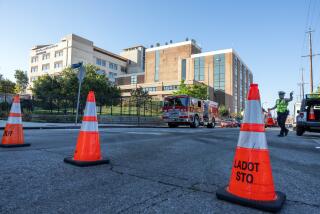Nurses at Dallas hospital describe poor safety measures with Ebola victim
- Share via
Reporting from Dallas — Nurses at a Texas hospital where a Liberian man died of Ebola described a confused and chaotic response to his arrival in the emergency room, alleging in a statement Tuesday that he languished for hours in a room with other patients and that hospital authorities resisted isolating him.
UPDATE: Second healthcare worker tests positive for Ebola
In addition, they said, the nurses tending him had flimsy protective gear and no proper training from hospital administrators in handling such a patient.
The allegations, made under unusual circumstances, provided the first detailed portrait of Thomas Eric Duncan’s second trip to the emergency room, where he arrived by ambulance days after doctors had sent him home with a fever, a headache, abdominal pain and a prescription for antibiotics.
Tuesday’s claims came during a conference call with reporters in which none of the nurses from Texas Health Presbyterian Hospital spoke or was identified to reporters. A statement outlining a litany of damning assertions was read by Deborah Burger, co-president of National Nurses United. The Oakland-based nurses union does not represent the Dallas nurses, who are nonunionized, but has been vocal about what it says are hospitals’ failures to prepare for Ebola.
The Dallas nurses asked the union to read their statement so they could air complaints anonymously and without fear of losing their jobs, National Nurses United Executive Director RoseAnn DeMoro said from Oakland. DeMoro refused to say how many nurses signed off on the letter or how many were on the media call, but she said all of them worked at Texas Health Presbyterian and had been involved in Duncan’s care or had direct knowledge of what had occurred after he arrived by ambulance Sept. 28.
They were spurred to speak out after their colleague Nina Pham, a 26-year-old registered nurse, contracted Ebola while treating Duncan, according to DeMoro. She said the nurses were angered over what they perceived to be health officials’ suggestions that Pham made a mistake that led to her exposure to the virus, which is believed to have killed more than 4,400 people in West Africa.
The nurses’ statement alleged that when Duncan was brought to Texas Health Presbyterian by ambulance with Ebola-like symptoms, he was “left for several hours, not in isolation, in an area” where up to seven other patients were. “Subsequently, a nurse supervisor arrived and demanded that he be moved to an isolation unit, yet faced stiff resistance from other hospital authorities,” they alleged.
Duncan’s lab samples were sent through the usual hospital tube system “without being specifically sealed and hand-delivered. The result is that the entire tube system … was potentially contaminated,” they said.
The statement described a hospital with no clear rules on how to handle Ebola patients, despite months of alerts from the U.S. Centers for Disease Control and Prevention in Atlanta about the possibility of Ebola coming to the United States.
“There was no advanced preparedness on what to do with the patient. There was no protocol. There was no system. The nurses were asked to call the infectious disease department” if they had questions, but that department didn’t have answers either, the statement said. So nurses were essentially left to figure things out on their own as they dealt with “copious amounts” of highly contagious bodily fluids from the dying Duncan while they wore gloves with no wrist tape, flimsy gowns that did not cover their necks, and no surgical booties, the statement alleged.
“Hospital officials allowed nurses who interacted with Mr. Duncan to then continue normal patient-care duties,” potentially exposing others, it said.
There was no way to independently confirm the allegations, which are in sharp contrast to statements from hospital officials. Since Duncan’s diagnosis last month and subsequent death, they have portrayed the 898-bed facility as up-to-date on CDC guidelines and prepared to handle Ebola.
“Patient and employee safety is our greatest priority, and we take compliance very seriously,” the hospital said in a statement. “We have numerous measures in place to provide a safe working environment, including mandatory annual training and a 24-7 hotline and other mechanisms that allow for anonymous reporting. Our nursing staff is committed to providing quality, compassionate care, as we have always known, and as the world has seen firsthand in recent days. We will continue to review and respond to any concerns raised by our nurses and all employees.”
In an interview after the nurses’ statement was released, one of Pham’s close friends, Jennifer Joseph, said Pham had never complained to her about problems at the hospital before or after she had been assigned to care for Duncan. Joseph, 25, is a nurse who once worked at the same hospital. She said she had been in regular contact with Pham since her hospitalization Friday.
Joseph said her friend was confident in the hospital’s protocols for preventing infection. She described Pham as a “brilliant” and caring nurse who was drafted to tend to Duncan because of her calm demeanor and experience.
Earlier in the day, before the nurses’ allegations were released, the hospital reported that Pham was in good condition and issued a statement from her. In it, Pham said she was “blessed to be cared for by the best team of doctors and nurses in the world,” adding, “I’m doing well and want to thank everyone for their kind wishes and prayers.”
The nurses’ allegations are sure to add to the questions surrounding the Dallas facility’s handling of Duncan, who first came to the ER on Sept. 25 only to be sent home again.
Although CDC Director Thomas Frieden has praised the hospital and its staff, he said Tuesday that the CDC might have prevented Pham’s infection if it had responded more aggressively to Duncan’s case. CDC experts were in the hospital Tuesday watching medical workers as they donned and removed the protective gear required to treat Pham and as they moved in and out of her isolation room. The goal is to ensure they follow guidelines to prevent transmission of the virus.
The CDC also plans to launch an “Ebola response team,” which will go to any hospital that reports an Ebola case. It will include healthcare workers with experience in Ebola outbreaks, Frieden said.
“I wish we had put a team like this on the ground the day the first patient was diagnosed,” he added, referring to Duncan. “That might have prevented this infection. But we will do that from this day onward.”
Although the CDC sent infectious disease specialists to Dallas after Duncan’s diagnosis, Frieden said, “with 20/20 hindsight,” he might have sent “a more robust hospital infection control team and been more hands-on” at the hospital.
Frieden said 76 other healthcare workers from the hospital were being monitored for possible Ebola symptoms, because they also might have been affected by whatever mistake led to Pham’s exposure. And a man who had direct contact with Pham was in isolation at Texas Health Presbyterian, even though he had not shown signs of illness.
Also Tuesday, Duncan’s nephew wrote in a Dallas Morning News article that the hospital had provided his uncle with substandard care. Josephus Weeks, a U.S. Army veteran who lives in North Carolina, questioned “the lack of answers and transparency coming from a hospital whose ignorance, incompetence and indecency has yet to be explained.”
“What happened at Texas Health Presbyterian Hospital Dallas must never happen to another family,” Weeks wrote.
And the World Health Organization predicted Tuesday that the deadly virus could lead to 5,000 to 10,000 new cases a week in Liberia, Sierra Leone and Guinea, the hardest-hit countries.
The WHO’s assistant director-general, Bruce Aylward, said at a Geneva news conference that some areas were seeing a slowing of new cases, which epidemiologists think is a result of greater awareness and a stepped-up response. But about 70% of those who fall ill in the three countries are dying, he said. He cautioned against assuming the outbreak had slowed.
“Quite frankly, it’s too early to say,” he said, adding that numbers can fluctuate because of lags in reporting and high caseloads. “People may draw the wrong conclusion that this is coming under control.”
geoffrey.mohan@latimes.com
tina.susman@latimes.com
molly.hennessy-fiske @latimes.com
Mohan and Hennessy-Fiske reported from Dallas, Susman from New York. Times staff writers Eryn Brown and Michael Muskal in Los Angeles contributed to this report.
More to Read
Sign up for Essential California
The most important California stories and recommendations in your inbox every morning.
You may occasionally receive promotional content from the Los Angeles Times.













